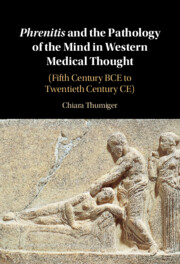 Phrenitis and the Pathology of the Mind in Western Medical Thought
Phrenitis and the Pathology of the Mind in Western Medical Thought Book contents
- Phrenitis and the Pathology of the Mind in Western Medical Thought
- Reviews
- Phrenitis and the Pathology of the Mind in Western Medical Thought
- Copyright page
- Contents
- Figures
- Acknowledgements
- Chapter 1 Preface and Methodological Issues
- Chapter 2 Phrenitis in Classical (Fifth–Fourth Centuries bce) and Hellenistic (Third–First Centuries bce) Medicine
- Chapter 3 Psychology and Delocalizing Themes
- Chapter 4 Theoretical Aspects of Imperial Nosology
- Chapter 5 Phrenitic People
- Chapter 6 Quasi phreneticus
- Chapter 7 The Byzantine and Medieval Periods
- Chapter 8 The Construction of the Phrenitic in Larger Society
- Chapter 9 Phrenitis in the Modern and Early-Modern Worlds
- Chapter 10 The Modern Age
- Book part
- Appendix 1 The ‘Sun Disease’
- Appendix 2 Naming, Nomenclatures, Dictionaries
- Appendix 3 Phrenitis from the Fifth Centurybceto the Twentieth Centuryce: A Synoptic Table
- General Index
Appendix 3 - Phrenitis from the Fifth Century bce to the Twentieth Century ce: A Synoptic Table
Published online by Cambridge University Press: 16 November 2023
- Phrenitis and the Pathology of the Mind in Western Medical Thought
- Reviews
- Phrenitis and the Pathology of the Mind in Western Medical Thought
- Copyright page
- Contents
- Figures
- Acknowledgements
- Chapter 1 Preface and Methodological Issues
- Chapter 2 Phrenitis in Classical (Fifth–Fourth Centuries bce) and Hellenistic (Third–First Centuries bce) Medicine
- Chapter 3 Psychology and Delocalizing Themes
- Chapter 4 Theoretical Aspects of Imperial Nosology
- Chapter 5 Phrenitic People
- Chapter 6 Quasi phreneticus
- Chapter 7 The Byzantine and Medieval Periods
- Chapter 8 The Construction of the Phrenitic in Larger Society
- Chapter 9 Phrenitis in the Modern and Early-Modern Worlds
- Chapter 10 The Modern Age
- Book part
- Appendix 1 The ‘Sun Disease’
- Appendix 2 Naming, Nomenclatures, Dictionaries
- Appendix 3 Phrenitis from the Fifth Centurybceto the Twentieth Centuryce: A Synoptic Table
- General Index
Summary
- Type
- Chapter
- Information
- Phrenitis and the Pathology of the Mind in Western Medical Thought(Fifth Century BCE to Twentieth Century CE), pp. 385 - 389Publisher: Cambridge University PressPrint publication year: 2023
- Creative Commons
- This content is Open Access and distributed under the terms of the Creative Commons Attribution licence CC-BY-NC-ND 4.0 https://creativecommons.org/cclicenses/
